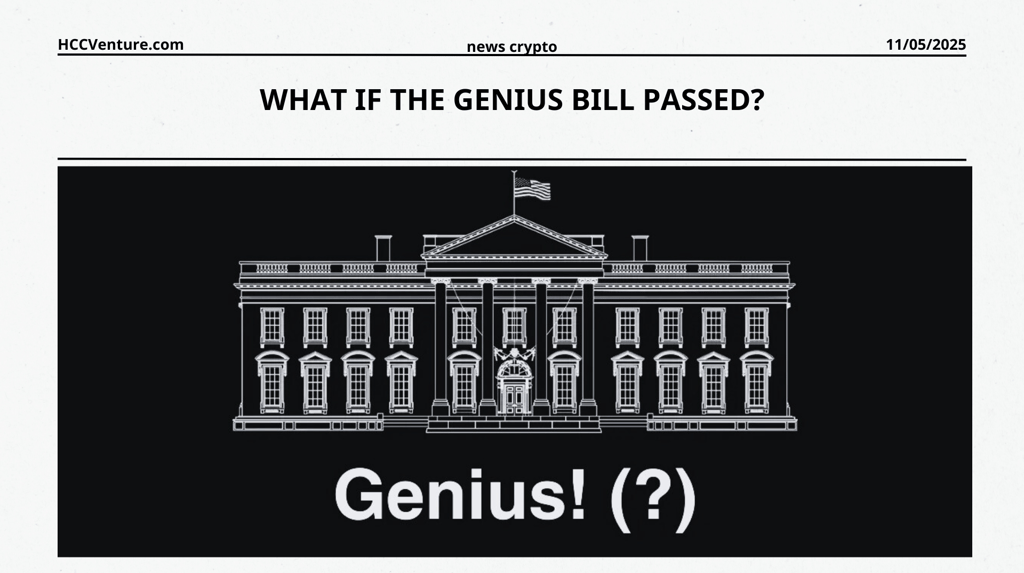The GENIUS Act Could Change Tether's Status in the US
The cryptocurrency market is witnessing a remarkable event with the draft GENIUS (Global Encryption and Novel Innovation for the United States) Bill in the United States. If passed, this bill will not only reshape the way stablecoins are managed but can also bring a great advantage to Tether - the issuer of USDT.
TIN TỨC
5/11/20253 min read


The GENIUS Act: Background and Key Content
The GENIUS Act is designed to create a clear regulatory framework for stablecoins in the United States, an important but challenging market for cryptocurrency companies. For years, stablecoins like Tether’s USDT have faced scrutiny from regulators like the Securities and Exchange Commission (SEC) and the Commodity Futures Trading Commission (CFTC). The lack of regulatory clarity has forced many companies, including Tether, to operate outside the United States or face legal risks.
The bill proposes several important changes:
Stablecoins will be considered a legitimate financial asset, with specific regulations on reserves and financial transparency.
Shared regulatory authority: The SEC and CFTC will have joint oversight, but with more clearly defined roles, minimizing conflicts of power.
Companies like Tether, if they meet strict standards for reserves and reporting, can operate legally in the United States without fear of prosecution.
These changes are seen as a major step towards bringing cryptocurrencies into the mainstream of the US economy, while also opening up opportunities for stablecoin companies to solidify their position.
Tether: The Biggest Beneficiary?
Tether, with a market capitalization of nearly $150 billion, is the dominant stablecoin globally. However, the company has long been criticized for its lack of transparency in managing its reserves and its regulatory issues in the United States. If the GENIUS Bill passes, Tether could take advantage of the following opportunities:
Currently, Tether mainly operates outside the United States due to regulatory risks. The GENIUS bill would allow Tether to establish an official presence in this market, expanding business opportunities and increasing trust from institutional investors.
One of Tether's weaknesses is the controversy over whether USDT is fully backed by real assets. With the bill's transparency requirements, Tether would be forced to disclose more details about its reserves, thereby reducing doubts and increasing credibility.
Other stablecoins like Circle’s USDC have gained traction in the United States thanks to strict regulatory compliance. If Tether can meet GENIUS’ standards, the company will have a chance to surpass USDC and cement its lead in the market.
A clear legal framework will encourage traditional banks and financial institutions to cooperate with Tether, thereby expanding the scope of USDT's use in cross-border transactions, payments, and decentralized finance (DeFi).
The Challenge for Tether
Despite the opportunities, Tether will face a number of challenges in taking advantage of the GENIUS Bill. First, the company will need to demonstrate that it meets strict standards for reserves and transparency, something that Tether has been criticized for failing to do. Disclosing financial details could expose weaknesses in its current operating model, which could undermine public trust.
Additionally, competition from rivals like Circle, which already has a good relationship with US regulators, will be fierce. If Tether does not adapt quickly, it risks losing market share to USDC or other stablecoins.
Bigger Impact on Cryptocurrency Market
Tether’s success in leveraging the GENIUS Bill could not only impact the company, but could reshape the entire cryptocurrency market. A well-regulated and legally-backed Tether in the United States would drive stablecoin adoption in traditional finance, leading to the growth of DeFi applications, NFTs, and cross-border transactions.
Furthermore, the United States establishing a clear regulatory framework for stablecoins would set a precedent for other countries. This could lead to a new wave of regulation globally, which is both an opportunity and a challenge for crypto companies that do not meet the standards.
Conclude
The GENIUS bill, if passed, would be a major turning point for the stablecoin market and Tether in particular. With the potential to legitimize operations, build trust, and expand the market, Tether has the opportunity to become the undisputed leader in the space. However, to realize its potential, the company will need to overcome barriers to transparency and fierce competition from rivals.
This event is not only a story about Tether but also a sign that cryptocurrencies are gradually being accepted as an integral part of the global financial system. In this context, monitoring the development of the GENIUS Bill will be an important factor in predicting the future of the cryptocurrency market in the coming years.
Explore HCCVenture group
HCCVenture © 2023. All rights reserved.

Connect with us
Popular content
Contact to us
E-mail : sp_contact@hccventure.com
Register : https://linktr.ee/holdcoincventure
Disclaimer: The information on this website is for informational purposes only and should not be considered investment advice. We are not responsible for any risks or losses arising from investment decisions based on the content here.


TERMS AND CONDITIONS • CUSTOMER PROTECTION POLICY
ANALYTICAL AND NEWS CONTENT IS COMPILED AND PROVIDED BY EXPERTS IN THE FIELD OF DIGITAL FINANCE AND BLOCKCHAIN BELONGING TO HCCVENTURE ORGANIZATION, INCLUDING OWNERSHIP OF THE CONTENT.
RESPONSIBLE FOR MANAGING ALL CONTENT AND ANALYSIS: HCCVENTURE FOUNDER - TRUONG MINH HUY
Read warnings about scams and phishing emails — REPORT A PROBLEM WITH OUR SITE.
